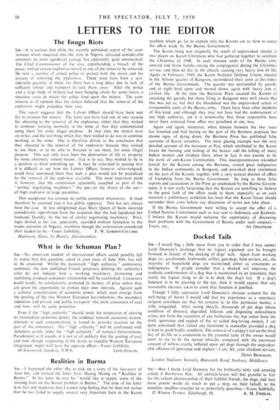LETTERS TO THE EDITOR
The Enugu Riots
SIR,—It is curious that while the recently published report of the com-
• mission which enquired into the riots in Nigeria attracted considerable attention, its most significant passage has apparently gone unremarked. 'The Chief Commissioner of the area, apprehending a breach of the peace, wished certain explosives stored at one of the mines to be removed. He sent a number of armed police to protect both the stores and the process of removing the explosives. There must have been a con- siderable quantity of them, for there Vvas a long delay due to lack of sufficient labour and transport to take them away After the police and a large body of strikers had been -hanging about for some hours, a situation arose in which the police fired upon the miners. The com- mission is of opinion that the miners believed that the removal of the explosives might prejudice their case.
The report suggests that the Labour Officer should have been sent for to reassure the miners. The latter can have had one of two reasons for objecting to the removal of the explosives, either that they wished to continue working normally in the mine or that they contemplated using them for some illegal purpose_ At that time the miners were on strike. and the last thing which they then wished to do was to continue working in the mine. One is therefore driven to the conclusion that they objected to the removal of the explosives because they wished to use them, or to be able to threaten to use them, for some illegal purpose. This can only have been the destruction of life or property by some extremely violent means ; that is to say, they wished to be in a position to blow something up. It may be remarked in passing that it is difficult to see how the Labour Officer, however silver-tongued, could have convinced them that such a plan would not be prejudiced by the removal of the explosive available. The most important point is, however, that the commission apparently accepted as part of the " normal negotiating machinery " the use—or the threat of the use— of high explosive in large quantities.
This acceptance has aroused no public comment whatsoever. It must therefore be assumed that it has public approval. This has not always been the case. In less enlightened days Mary Queen of Scots incurred considerable opprobrium from the suspicion that she had liquidated her husband. Darnley, by the use of similar negotiating machinery. Privi- leges denied to her are, apparently, accorded without hesitation to the trades unionists of Nigeria, worthless though the commission considered






































 Previous page
Previous page